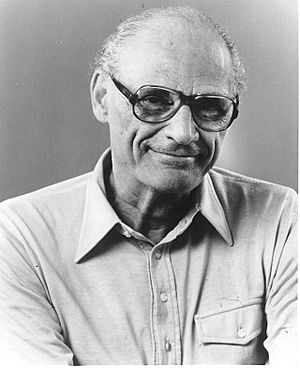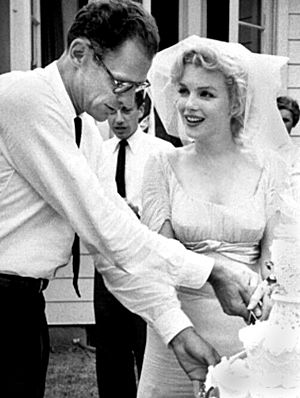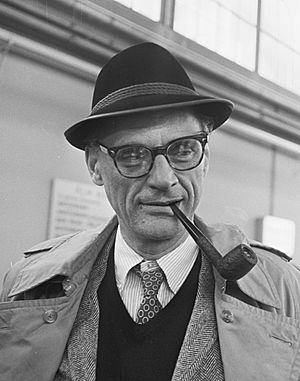Arthur Miller facts for kids
Quick facts for kids
Arthur Miller
|
|
|---|---|

Miller in 1997
|
|
| Born | Arthur Asher Miller October 17, 1915 New York City, U.S. |
| Died | February 10, 2005 (aged 89) Roxbury, Connecticut, U.S. |
| Occupation |
|
| Alma mater | University of Michigan |
| Notable works |
|
| Notable awards |
|
| Spouse |
Mary Slattery
(m. 1940; div. 1956) |
| Partner | Agnes Barley (from 2002) |
| Children | 4, including Rebecca |
| Relatives |
|
| Signature | |
Arthur Asher Miller (born October 17, 1915 – died February 10, 2005) was a famous American writer. He wrote plays, essays, and screenplays in the 20th century. Some of his most well-known plays include All My Sons (1947), Death of a Salesman (1949), The Crucible (1953), and A View from the Bridge (1955).
He also wrote screenplays for movies. His work on The Misfits (1961) is especially famous. Many people consider Death of a Salesman to be one of the best American plays ever written.
Miller was often in the news, especially from the late 1940s to the early 1960s. During this time, he won a Pulitzer Prize for Drama. He also had to speak before a government committee. And he married the famous actress Marilyn Monroe. He received many awards throughout his life for his writing.
Contents
Biography
Early Life and Education
Arthur Miller was born in Harlem, a neighborhood in Manhattan, New York City. He was the second of three children. His family was Jewish and came from Poland.
His father owned a clothing business and was very successful. The family lived well, with a summer house and a chauffeur. But in 1929, the Great Depression hit. His family lost almost all their money. They had to move to a different part of Brooklyn.
As a teenager, Miller worked hard to help his family. He delivered bread every morning before school. After finishing high school in 1932, he took many small jobs. He saved money to pay for college at the University of Michigan.
At the University of Michigan, Miller first studied journalism. He wrote for the student newspaper. It was there that he wrote his first play, No Villain. He later changed his major to English. He won an award for No Villain, which made him think about becoming a playwright.
He took a playwriting class with Professor Kenneth Rowe. This teacher helped Miller understand how plays are built. Rowe gave him good advice and encouraged him. Miller stayed close to his university throughout his life. He even created awards for dramatic writing there.
After graduating in 1938, Miller joined the Federal Theatre Project. This was a government program that created jobs in theater. He chose this over a higher-paying job as a movie scriptwriter. However, the program closed in 1939. Miller then worked in the Brooklyn Navy Yard. He also kept writing radio plays, some of which were broadcast on CBS.
Starting His Career
In 1940, Arthur Miller married Mary Grace Slattery. They had two children, Jane and Robert. Miller did not serve in World War II. This was because of an old football injury to his knee.
In 1944, Miller's first play, The Man Who Had All the Luck, was produced. It won an award. However, the play closed quickly after only four performances. The reviews were not good.
But in 1947, Miller's play All My Sons became a big success on Broadway. He had started writing it in 1941. This play helped him become known as an important playwright. He even won his first Tony Award for it. Miller later said that good reviews from The New York Times saved the play from failing.
In 1948, Miller built a small studio in Roxbury, Connecticut. There, he wrote the first act of Death of a Salesman in less than a day. He finished the rest of the play in six weeks. This play became one of the most famous plays in the world.
Death of a Salesman opened on Broadway on February 10, 1949. It was a huge success with both audiences and critics. It won a Tony Award, the New York Drama Circle Critics' Award, and the Pulitzer Prize for Drama. It was the first play to win all three major awards. The play was performed 742 times.
Important Years
In 1955, a shorter version of Miller's play A View from the Bridge opened on Broadway. The next year, Miller rewrote it as a longer play. A movie based on the play was released in 1962.
Marriages and Family Life
In June 1956, Miller divorced his first wife, Mary Slattery. He then married the famous movie star Marilyn Monroe. They had met in 1951 and stayed in touch. Monroe was 30 when they married. She had not had a strong family growing up. She was eager to be part of Miller's family.
Monroe started to feel tired of Hollywood. She told Miller she wanted a quieter life in the country. She wanted to be there for him. Monroe also converted to Judaism to feel closer to Miller and his family.
Life away from Hollywood became more normal for Monroe. She started cooking and taking care of the house. She gave Miller more attention than he was used to.
Later that year, Miller was called to testify before a government committee. Monroe went with him.
In 1960, Miller started writing the screenplay for the movie The Misfits. Marilyn Monroe starred in it. During the filming, Miller and Monroe's relationship became difficult. Miller later said that filming was one of the hardest times in his life. Monroe had trouble sleeping and remembering her lines.
Miller and Monroe divorced in 1961, after five years of marriage. Monroe died 19 months later, in August 1962.
In February 1962, Miller married photographer Inge Morath. She had taken pictures during the filming of The Misfits. They had two children. Their daughter, Rebecca, was born in September 1962. Their son, Daniel, was born in November 1966 with Down syndrome. Miller and Inge stayed together until her death in 2002. Miller's son-in-law, actor Daniel Day-Lewis, visited Daniel often. He also encouraged Miller to visit his son.
Later Career and Achievements
In 1964, Miller's play After the Fall was produced. Many people felt it was about his marriage to Marilyn Monroe. Miller worked with his old friend Elia Kazan on the play. It caused a lot of discussion because it seemed to show a character like Monroe on stage.
That same year, Miller also wrote Incident at Vichy. In 1965, he became the first American president of PEN International. This is an organization for writers. He held this position for four years. He also wrote the play The Price in 1968. It was very successful, like Death of a Salesman.
In 1969, Miller's plays were banned in the Soviet Union. This happened after he spoke out for writers who were not allowed to express their ideas freely. In the 1970s, he tried new things in theater. He wrote one-act plays and traveled with his wife, Inge Morath. They created books together about their travels.
Miller often wrote about his own plays. In 1978, he published a collection of his Theater Essays. In these essays, he shared his thoughts on theater and society.
In 1983, Miller went to China. He directed Death of a Salesman at a theater in Beijing. It was a big success there. In 1984, he wrote a book called Salesman in Beijing about his experiences. Around the same time, Death of a Salesman was made into a television movie. It starred Dustin Hoffman and was watched by 25 million people.
In 1987, Miller published his autobiography, Timebends. In this book, he wrote in detail about his experiences with Marilyn Monroe. Before this, he usually did not talk about her in interviews.
In the early 1990s, Miller wrote three new plays: The Ride Down Mt. Morgan (1991), The Last Yankee (1992), and Broken Glass (1994). In 1996, a movie version of The Crucible was released. Miller worked on the screenplay for the film.
His play Mr. Peters' Connections was staged in 1998. In 1999, Death of a Salesman was brought back to Broadway to celebrate its 50th anniversary. It was very successful again.
Miller received many honors in his later years. In 1993, he received the National Medal of Arts. In 2001, he gave the Jefferson Lecture, a high honor for achievements in the humanities. He also won the Dorothy and Lillian Gish Prize and the Principe de Asturias Prize for Literature. In 2003, he won the Jerusalem Prize.
In 2004, Miller's last play, Finishing the Picture, opened in Chicago. It was said to be based on his experiences during the filming of The Misfits.
Death
Arthur Miller passed away on February 10, 2005. He was 89 years old. This was also the 56th anniversary of Death of a Salesman opening on Broadway. He died at his home in Roxbury, Connecticut, from bladder cancer and heart failure. He was surrounded by his family and friends. He was buried in Roxbury Center Cemetery.
Legacy
Arthur Miller's writing career lasted over 70 years. When he died, he was seen as one of the greatest playwrights of the 20th century. Many famous actors and directors honored him. They called him the last great writer for the American stage. Broadway theaters dimmed their lights to show respect.
His old university, the University of Michigan, opened the Arthur Miller Theatre in 2007. It is the only theater in the world named after him, as he wished.
Miller's letters, notes, and other papers are kept at the Harry Ransom Center at the University of Texas at Austin. He is also a member of the American Theater Hall of Fame. He was added in 1979.
In 1993, he received the Four Freedoms Award for Freedom of Speech. In 2017, his daughter, Rebecca Miller, made a documentary about his life called Arthur Miller: Writer. A small planet, 3769 Arthurmiller, is named after him.
Arthur Miller Foundation
The Arthur Miller Foundation was created to honor Miller's memory. It also aims to support theater arts education in public schools. Its goal is to help more students get theater education as part of their learning.
The foundation works to train new theater teachers. It also helps place them in public schools. It supports current theater teachers and provides resources like theater tickets for students. The main goal is to provide arts education in the New York City school system. Many famous people are part of the foundation's council, including Alec Baldwin and Dustin Hoffman.
In November 2015, the foundation celebrated Miller's 100th birthday. They held a special performance of his famous works. The foundation also supports a pilot program in theater and film at a public school. This program aims to create a lasting model for theater education.
Miller's Archive
Miller gave some of his early writings to the Harry Ransom Center in 1961 and 1962. This included his original notebooks and early typed versions of Death of a Salesman and The Crucible. In 2018, the Ransom Center received the rest of Miller's papers. The full collection opened in November 2019.
Writings and Public Views
A book called Arthur Miller: The Definitive Biography was written about him. It was based on papers Miller shared before he died. The book showed that Miller had strongly criticized unfairness in American society.
Works
Stage Plays
- No Villain (1936)
- They Too Arise (1937)
- Honors at Dawn (1938)
- The Grass Still Grows (1938)
- The Great Disobedience (1938)
- Listen My Children (1939)
- The Golden Years (1940)
- The Half-Bridge (1943)
- The Man Who Had All the Luck (1944)
- All My Sons (1947)
- Death of a Salesman (1949)
- An Enemy of the People (1950, based on Henrik Ibsen's play)
- The Crucible (1953)
- A View from the Bridge (1955)
- A Memory of Two Mondays (1955)
- After the Fall (1964)
- Incident at Vichy (1964)
- The Price (1968)
- The Reason Why (1970)
- Fame (one-act, 1970)
- The Creation of the World and Other Business (1972)
- Up from Paradise (1974)
- The Archbishop's Ceiling (1977)
- The American Clock (1980)
- Playing for Time (television play, 1980)
- Elegy for a Lady (short play, 1982)
- Some Kind of Love Story (short play, 1982)
- I Think About You a Great Deal (1986)
- Playing for Time (stage version, 1985)
- I Can't Remember Anything (1987)
- Clara (1987)
- The Ride Down Mt. Morgan (1991)
- The Last Yankee (1993)
- Broken Glass (1994)
- Mr. Peters' Connections (1998)
- Resurrection Blues (2002)
- Finishing the Picture (2004)
Radio Plays
- The Pussycat and the Expert Plumber Who Was a Man (1941)
- Joel Chandler Harris (1941)
- The Battle of the Ovens (1942)
- Thunder from the Mountains (1942)
- I Was Married in Bataan (1942)
- That They May Win (1943)
- Listen for the Sound of Wings (1943)
- Bernardine (1944)
- I Love You (1944)
- Grandpa and the Statue (1944)
- The Philippines Never Surrendered (1944)
- The Guardsman (1944)
- The Story of Gus (1947)
Selected Screenplays
- The Hook (1947)
- All My Sons (1948)
- The Misfits (1961)
- Death of a Salesman (1985)
- Everybody Wins (1990)
- The Crucible (1996)
Assorted Fiction
- Focus (novel, 1945)
- "The Misfits" (short story, 1957)
- I Don't Need You Anymore (short stories, 1967)
- "Homely Girl: A Life" (short story, 1992)
- "The Performance" (short story)
- Presence: Stories (2007)
Non-Fiction
- Situation Normal (1944)
- In Russia (1969)
- In the Country (1977)
- Chinese Encounters (1979)
- Salesman in Beijing (1984)
- Timebends: A Life (1987)
- "On Politics and the Art of Acting" (2001)
Collections
- Abbotson, Susan C. W. (ed.), Arthur Miller: Collected Essays, Penguin 2016
- Centola, Steven R. ed. Echoes Down the Corridor: Arthur Miller, Collected Essays 1944–2000, Viking Penguin (US)/Methuen (UK), 2000
- Kushner, Tony, ed. Arthur Miller, Collected Plays 1944–1961 (Library of America, 2006)
- Martin, Robert A. (ed.), "The theater essays of Arthur Miller", foreword by Arthur Miller. NY: Viking Press, 1978
Images for kids
See also
 In Spanish: Arthur Miller para niños
In Spanish: Arthur Miller para niños
 | Madam C. J. Walker |
 | Janet Emerson Bashen |
 | Annie Turnbo Malone |
 | Maggie L. Walker |



